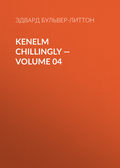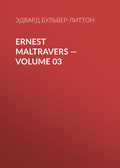
Эдвард Бульвер-Литтон
Eugene Aram — Complete
CHAPTER V.
IN WHICH THE STORY RETURNS TO WALTER AND THE CORPORAL.—THE
RENCONTRE WITH A STRANGER, AND HOW THE STRANGER PROVES TO BE
NOT ALTOGETHER A STRANGER
Being got out of town in the road to Penaflor, master of my own
action, and forty good ducats; the first thing I did was to
give my mule her head, and to go at what pace she pleased.
.............
I left them in the inn, and continued my journey; I was hardly
got half-a-mile farther, when I met a cavalier very genteel,
—Gil Blas.
It was broad and sunny noon on the second day of their journey, as Walter Lester, and the valorous attendant with whom it had pleased Fate to endow him, rode slowly into a small town in which the Corporal in his own heart, had resolved to bait his roman-nosed horse and refresh himself. Two comely inns had the younger traveller of the twain already passed with an indifferent air, as if neither bait nor refreshment made any part of the necessary concerns of this habitable world. And in passing each of the said hostelries, the roman-nosed horse had uttered a snort of indignant surprise, and the worthy Corporal had responded to the quadrupedal remonstrance by a loud hem. It seemed, however, that Walter heard neither of the above significant admonitions; and now the town was nearly passed, and a steep hill that seemed winding away into eternity, already presented itself to the rueful gaze of the Corporal.
“The boy’s clean mad,” grunted Bunting to himself—“must do my duty to him—give him a hint.”
Pursuant to this notable and conscientious determination, Bunting jogged his horse into a trot, and coming alongside of Walter, put his hand to his hat and said:
“Weather warm, your honour—horses knocked up—next town far as hell!—halt a bit here—augh!”
“Ha! that is very true, Bunting; I had quite forgotten the length of our journey. But see, there is a sign-post yonder, we will take advantage of it.”
“Augh! and your honour’s right—fit for the forty-second;” said the Corporal, falling back; and in a few moments he and his charger found themselves, to their mutual delight, entering the yard of a small, but comfortable-looking inn.
The Host, a man of a capacious stomach and a rosy cheek—in short, a host whom your heart warms to see, stepped forth immediately, held the stirrup for the young Squire, (for the Corporal’s movements were too stately to be rapid,) and ushered him with a bow, a smile, and a flourish of his napkin, into one of those little quaint rooms, with cupboards bright with high glasses and old china, that it pleases us still to find extant in the old-fashioned inns, in our remoter roads and less Londonized districts.
Mine host was an honest fellow, and not above his profession; he stirred the fire, dusted the table, brought the bill of fare, and a newspaper seven days old, and then bustled away to order the dinner and chat with the Corporal. That accomplished hero had already thrown the stables into commotion, and frightening the two ostlers from their attendance on the steeds of more peaceable men, had set them both at leading his own horse and his master’s to and fro’ the yard, to be cooled into comfort and appetite.
He was now busy in the kitchen, where he had seized the reins of government, sent the scullion to see if the hens had laid any fresh eggs, and drawn upon himself the objurgations of a very thin cook with a squint.
“Tell you, ma’am, you are wrong—quite wrong—have seen the world—old soldier—and know how to fry eggs better than any she in the three kingdoms—hold jaw—mind your own business—where’s the frying-pan?—baugh!”
So completely did the Corporal feel himself in his element, while he was putting everybody else out of the way; and so comfortable did he find his new quarters, that he resolved that the “bait” should be at all events prolonged until his good cheer had been deliberately digested, and his customary pipe duly enjoyed.
Accordingly, but not till Walter had dined, for our man of the world knew that it is the tendency of that meal to abate our activity, while it increases our good humour, the Corporal presented himself to his master, with a grave countenance.
“Greatly vexed, your honour—who’d have thought it?—but those large animals are bad on long march.”
“Why what’s the matter now, Bunting?”
“Only, Sir, that the brown horse is so done up, that I think it would be as much as life’s worth to go any farther for several hours.”
“Very well, and if I propose staying here till the evening?—we have ridden far, and are in no great hurry.”
“To be sure not—sure and certain not,” cried the Corporal. “Ah, Master, you know how to command, I see. Nothing like discretion—discretion, Sir, is a jewel. Sir, it is more than jewel—it’s a pair of stirrups!”
“A what? Bunting.”
“Pair of stirrups, your honour. Stirrups help us to get on, so does discretion; to get off, ditto discretion. Men without stirrups look fine, ride bold, tire soon: men without discretion cut dash, but knock up all of a crack. Stirrups—but what sinnifies? Could say much more, your honour, but don’t love chatter.”
“Your simile is ingenious enough, if not poetical,” said Walter; “but it does not hold good to the last. When a man falls, his discretion should preserve him; but he is often dragged in the mud by his stirrups.”
“Beg pardon—you’re wrong,” quoth the Corporal, nothing taken by surprise; “spoke of the new-fangled stirrups that open, crank, when we fall, and let us out of the scrape.” [Note: Of course the Corporal does not speak of the patent stirrup: that would be an anachronism.]
Satisfied with this repartee, the Corporal now (like an experienced jester) withdrew to leave its full effect on the admiration of his master. A little before sunset the two travellers renewed their journey.
“I have loaded the pistols, Sir,” said the Corporal, pointing to the holsters on Walter’s saddle. “It is eighteen miles off to the next town—will be dark long before we get there.”
“You did very right, Bunting, though I suppose there is not much danger to be apprehended from the gentlemen of the highway.”
“Why the Landlord do say the revarse, your honour,—been many robberies lately in these here parts.”
“Well, we are fairly mounted, and you are a formidable-looking fellow, Bunting.”
“Oh! your honour,” quoth the Corporal, turning his head stiffly away, with a modest simper, “You makes me blush; though, indeed, bating that I have the military air, and am more in the prime of life, your honour is well nigh as awkward a gentleman as myself to come across.”
“Much obliged for the compliment!” said Walter, pushing his horse a little forward—the Corporal took the hint and fell back.
It was now that beautiful hour of twilight when lovers grow especially tender. The young traveller every instant threw his dark eyes upward, and thought—not of Madeline, but her sister. The Corporal himself grew pensive, and in a few moments his whole soul was absorbed in contemplating the forlorn state of the abandoned Jacobina.
In this melancholy and silent mood, they proceeded onward till the shades began to deepen; and by the light of the first stars Walter beheld a small, spare gentleman riding before him on an ambling nag, with cropped ears and mane. The rider, as he now came up to him, seemed to have passed the grand climacteric, but looked hale and vigorous; and there was a certain air of staid and sober aristocracy about him, which involuntarily begat your respect.
He looked hard at Walter as the latter approached, and still more hard at the Corporal. He seemed satisfied with the survey.
“Sir,” said he, slightly touching his hat to Walter, and with an agreeable though rather sharp intonation of voice, “I am very glad to see a gentleman of your appearance travelling my road. Might I request the honour of being allowed to join you so far as you go? To say the truth, I am a little afraid of encountering those industrious gentlemen who have been lately somewhat notorious in these parts; and it may be better for all of us to ride in as strong a party as possible.”
“Sir,” replied Walter, eyeing in his turn the speaker, and in his turn also feeling satisfied with the scrutiny, “I am going to—, where I shall pass the night on my way to town; and shall be very happy in your company.”
The Corporal uttered a loud hem; that penetrating man of the world was not too well pleased with the advances of a stranger.
“What fools them boys be!” thought he, very discontentedly; “howsomever, the man does seem like a decent country gentleman, and we are two to one: besides, he’s old, little, and—augh, baugh—I dare say, we are safe enough, for all he can do.”
The Stranger possessed a polished and well-bred demeanour; he talked freely and copiously, and his conversation was that of a shrewd and cultivated man. He informed Walter that, not only the roads had been infested by those more daring riders common at that day, and to whose merits we ourselves have endeavoured to do justice in a former work of blessed memory, but that several houses had been lately attempted, and two absolutely plundered.
“For myself,” he added, “I have no money, to signify, about my person: my watch is only valuable to me for the time it has been in my possession; and if the rogues robbed one civilly, I should not so much mind encountering them; but they are a desperate set, and use violence when there is nothing to be got by it. Have you travelled far to-day, Sir?”
“Some six or seven-and-twenty miles,” replied Walter. “I am proceeding to London, and not willing to distress my horses by too rapid a journey.”
“Very right, very good; and horses, Sir, are not now what they used to be when I was a young man. Ah, what wagers I used to win then! Horses galloped, Sir, when I was twenty; they trotted when I was thirty-five; but they only amble now. Sir, if it does not tax your patience too severely, let us give our nags some hay and water at the half-way house yonder.”
Walter assented; they stopped at a little solitary inn by the side of the road, and the host came out with great obsequiousness when he heard the voice of Walter’s companion.
“Ah, Sir Peter!” said he, “and how be’st your honour—fine night, Sir Peter—hope you’ll get home safe, Sir Peter.”
“Safe—ay! indeed, Jock, I hope so too. Has all been quiet here this last night or two?”
“Whish, Sir!” whispered my host, jerking his thumb back towards the house; “there be two ugly customers within I does not know: they have got famous good horses, and are drinking hard. I can’t say as I knows any thing agen ‘em, but I think your honours had better be jogging.”
“Aha! thank ye, Jock, thank ye. Never mind the hay now,” said Sir Peter, pulling away the reluctant mouth of his nag; and turning to Walter, “Come, Sir, let us move on. Why, zounds! where is that servant of yours?”
Walter now perceived, with great vexation, that the Corporal had disappeared within the alehouse; and looking through the casement, on which the ruddy light of the fire played cheerily, he saw the man of the world lifting a little measure of “the pure creature” to his lips; and close by the hearth, at a small, round table, covered with glasses, pipes, he beheld two men eyeing the tall Corporal very wistfully, and of no prepossessing appearance themselves. One, indeed, as the fire played full on his countenance, was a person of singularly rugged and sinister features; and this man, he now remarked, was addressing himself with a grim smile to the Corporal, who, setting down his little “noggin,” regarded him with a stare, which appeared to Walter to denote recognition. This survey was the operation of a moment; for Sir Peter took it upon himself to despatch the landlord into the house, to order forth the unseasonable carouser; and presently the Corporal stalked out, and having solemnly remounted, the whole trio set onward in a brisk trot. As soon as they were without sight of the ale-house, the Corporal brought the aquiline profile of his gaunt steed on a level with his master’s horse.
“Augh, Sir!” said he, with more than his usual energy of utterance, “I see’d him!”
“Him! whom?”
“Man with ugly face what drank at Peter Dealtry’s, and knew Master Aram,—knew him in a crack,—sure he’s a Tartar!”
“What! does your servant recognize one of those suspicious fellows whom Jock warned us against?” cried Sir Peter, pricking up his ears.
“So it seems, Sir,” said Walter: “he saw him once before, many miles hence; but I fancy he knows nothing really to his prejudice.”
“Augh!” cried the Corporal; “he’s d—d ugly any how!”
“That’s a tall fellow of yours,” said Sir Peter, jerking up his chin with that peculiar motion common to the brief in stature, when they are covetous of elongation. “He looks military:—has he been in the army? Ay, I thought so; one of the King of Prussia’s grenadiers, I suppose? Faith, I hear hoofs behind!”
“Hem!” cried the Corporal, again coming alongside of his master. “Beg pardon, Sir—served in the 42nd—nothing like regular line—stragglers always cut off—had rather not straggle just now—enemy behind!”
Walter looked back, and saw two men approaching them at a hand-gallop. “We are a match at least for them, Sir,” said he, to his new acquaintance.
“I am devilish glad I met you,” was Sir Peter’s rather selfish reply.
“‘Tis he! ‘tis the devil!” grunted the Corporal, as the two men now gained their side and pulled up; and Walter recognised the faces he had marked in the ale-house.
“Your servant, gentlemen,” quoth the uglier of the two; “you ride fast—”
“And ready;—bother—baugh!” chimed in the Corporal, plucking a gigantic pistol from his holster, without any farther ceremony.
“Glad to hear it, Sir!” said the hard-featured Stranger, nothing dashed. “But I can tell you a secret!”
“What’s that—augh?” said the Corporal, cocking his pistol.
“Whoever hurts you, friend, cheats the gallows!” replied the stranger, laughing, and spurring on his horse, to be out of reach of any practical answer with which the Corporal might favour him. But Bunting was a prudent man, and not apt to be choleric.
“Bother!” said he, and dropped his pistol, as the other stranger followed his ill-favoured comrade.
“You see we are too strong for them!” cried Sir Peter, gaily; “evidently highwaymen! How very fortunate that I should have fallen in with you!”
A shower of rain now began to fall. Sir Peter looked serious—he halted abruptly—unbuckled his cloak, which had been strapped before his saddle—wrapped himself up in it—buried his face in the collar—muffled his chin with a red handkerchief, which he took out of his pocket, and then turning to Walter, he said to him, “What! no cloak, Sir? no wrapper even? Upon my soul I am very sorry I have not another handkerchief to lend you!”
“Man of the world—baugh!” grunted the Corporal, and his heart quite warmed to the stranger he had at first taken for a robber.
“And now, Sir,” said Sir Peter, patting his nag, and pulling up his cloak-collar still higher, “let us go gently; there is no occasion for hurry. Why distress our horses?—”
“Really, Sir,” said Walter, smiling, “though I have a great regard for my horse, I have some for myself; and I should rather like to be out of this rain as soon as possible.”
“Oh, ah! you have no cloak. I forgot that; to be sure—to be sure, let us trot on, gently—though—gently. Well, Sir, as I was saying, horses are not so swift as they were. The breed is bought up by the French! I remember once, Johnny Courtland and I, after dining at my house, till the champagne had played the dancing-master to our brains, mounted our horses, and rode twenty miles for a cool thousand the winner. I lost it, Sir, by a hair’s breadth; but I lost it on purpose; it would have half ruined Johnny Courtland to have paid me, and he had that delicacy, Sir,—he had that delicacy, that he would not have suffered me to refuse taking his money,—so what could I do, but lose on purpose? You see I had no alternative!”
“Pray, Sir,” said Walter, charmed and astonished at so rare an instance of the generosity of human friendships—“Pray, Sir, did I not hear you called Sir Peter, by the landlord of the little inn? can it be, since you speak so familiarly of Mr. Courtland, that I have the honour to address Sir Peter Hales?”
“Indeed that is my name,” replied the gentleman, with some surprise in his voice. “But I have never had the honour of seeing you before.”
“Perhaps my name is not unfamiliar to you,” said Walter. “And among my papers I have a letter addressed to you from my uncle Rowland Lester.
“God bless me!” cried Sir Peter, “What Rowy!—well, indeed I am overjoyed to hear of him. So you are his nephew? Pray tell me all about him, a wild, gay, rollicking fellow still, eh?” Always fencing, sa—sa! or playing at billiards, or hot in a steeple chace; there was not a jollier, better-humoured fellow in the world than Rowy Lester.
“You forget, Sir Peter,” said Walter, laughing at a description so unlike his sober and steady uncle, “that some years have passed since the time you speak of.”
“Ah, and so there have,” replied Sir Peter; “and what does your uncle say of me?”
“That, when he knew you, you were generosity, frankness, hospitality itself.”
“Humph, humph!” said Sir Peter, looking extremely disconcerted, a confusion which Walter imputed solely to modesty. “I was hairbrained foolish fellow then, quite a boy, quite a boy; but bless me, it rains sharply, and you have no cloak. But we are close on the town now. An excellent inn is the ‘Duke of Cumberland’s Head,’ you will have charming accommodation there.”
“What, Sir Peter, you know this part of the country well!”
“Pretty well, pretty well; indeed I live near, that is to say not very far from, the town. This turn, if you please. We separate here. I have brought you a little out of your way—not above a mile or two—for fear the robbers should attack me if I was left alone. I had quite forgot you had no cloak. That’s your road—this mine. Aha! so Rowy Lester is still alive and hearty, the same excellent, wild fellow, no doubt. Give my kindest remembrance to him when you write. Adieu, Sir.”
This latter speech having been delivered during a halt, the Corporal had heard it: he grinned delightedly as he touched his hat to Sir Peter, who now trotted off, and muttered to his young master:—
“Most sensible man, that, Sir!”
CHAPTER VI.
SIR PETER DISPLAYED.—ONE MAN OF THE WORLD SUFFERS FROM
ANOTHER.—THE INCIDENT OF THE BRIDLE BEGETS THE INCIDENT OF
THE SADDLE; THE INCIDENT OF THE SADDLE BEGETS THE INCIDENT OF
THE WHIP; THE INCIDENT OF THE WHIP BEGETS WHAT THE READER MUST
READ TO SEE
Nihil est aliud magnum quam multa minuta.
—Vetus Auctor.
[Nor is their anything that hath so great a power as the aggregate of small things.]
“And so,” said Walter, the next morning to the head waiter, who was busied about their preparations for breakfast; “and so, Sir Peter Hales, you say, lives within a mile of the town?”
“Scarcely a mile, Sir,—black or green? you passed the turn to his house last night;—Sir, the eggs are quite fresh this morning. This inn belongs to Sir Peter.”
“Oh!—Does Sir Peter see much company?”
The waiter smiled.
“Sir Peter gives very handsome dinners, Sir; twice a year! A most clever gentleman, Sir Peter! They say he is the best manager of property in the whole county. Do you like Yorkshire cake?—toast? yes, Sir!”
“So so,” said Walter to himself, “a pretty true description my uncle gave me of this gentleman. ‘Ask me too often to dinner, indeed!’—‘offer me money if I want it!’—‘spend a month at his house!’—‘most hospitable fellow in the world!’—My uncle must have been dreaming.”
Walter had yet to learn, that the men most prodigal when they have nothing but expectations, are often most thrifty when they know the charms of absolute possession. Besides, Sir Peter had married a Scotch lady, and was blessed with eleven children! But was Sir Peter Hales much altered? Sir Peter Hales was exactly the same man in reality that he always had been. Once he was selfish in extravagance; he was now selfish in thrift. He had always pleased himself, and damned other people; that was exactly what he valued himself on doing now. But the most absurd thing about Sir Peter was, that while he was for ever extracting use from every one else, he was mightily afraid of being himself put to use. He was in parliament, and noted for never giving a frank out of his own family. Yet withal, Sir Peter Hales was still an agreeable fellow; nay, he was more liked and much more esteemed than ever. There is something conciliatory in a saving disposition; but people put themselves in a great passion when a man is too liberal with his own. It is an insult on their own prudence. “What right has he to be so extravagant? What an example to our servants!” But your close neighbour does not humble you. You love your close neighbour; you respect your close neighbour; you have your harmless jest against him—but he is a most respectable man.
“A letter, Sir, and a parcel, from Sir Peter Hales,” said the waiter, entering.
The parcel was a bulky, angular, awkward packet of brown paper, sealed once and tied with the smallest possible quantity of string; it was addressed to Mr. James Holwell, Saddler,—Street,—The letter was to—Lester Esq., and ran thus, written in a very neat, stiff, Italian character.
“Dr Sr,
“I trust you had no difficulty in findg ye Duke of Cumberland’s Head, it is an excellent In.
“I greatly regt yt you are unavoidy oblig’d to go on to Londn; for, otherwise I shd have had the sincerest please in seeing you here at dinr, introducing you to Ly Hales. Anothr time I trust we may be more fortunate.
“As you pass thro’ ye litte town of..., exactly 21 miles from hence, on the road to Londn, will you do me the favr to allow your servt to put the little parcel I send into his pockt, drop it as directd. It is a bridle I am forc’d to return. Country workn are such bungrs.
“I shd most certainy have had ye honr to wait on you persony, but the rain has given me a mo seve cold;—hope you have escap’d, tho’ by ye by, you had no cloke, nor wrappr!
“My kindest regards to your mo excellent unce. I am quite sure he’s the same fine merry fellw he always was,—tell him so!
“Dr Sr, Yours faithy,
“Peter Grindlescrew Hales.
“P.S. You know perhs yt poor Jno Courtd, your uncle’s mo intime friend, lives in..., the town in which your servt will drop ye bride. He is much alter’d,—poor Jno!”
“Altered! alteration then seems the fashion with my uncle’s friends!” thought Walter, as he rang for the Corporal, and consigned to his charge the unsightly parcel.
“It is to be carried twenty-one miles at the request of the gentleman we met last night,—a most sensible man, Bunting.”
“Augh—whaugh,—your honour!” grunted the Corporal, thrusting the bridle very discontentedly into his pocket, where it annoyed him the whole journey, by incessantly getting between his seat of leather and his seat of honour. It is a comfort to the inexperienced, when one man of the world smarts from the sagacity of another; we resign ourselves more willingly to our fate. Our travellers resumed their journey, and in a few minutes, from the cause we have before assigned, the Corporal became thoroughly out of humour.
“Pray, Bunting,” said Walter, calling his attendant to his side, “do you feel sure that the man we met yesterday at the alehouse, is the same you saw at Grassdale some months ago?”
“Damn it!” cried the Corporal quickly, and clapping his hand behind.
“How, Sir!”
“Beg pardon, your honour—slip tongue, but this confounded parcel!—augh—bother!”
“Why don’t you carry it in your hand?”
“‘Tis so ungainsome, and be d—d to it; and how can I hold parcel and pull in this beast, which requires two hands; his mouth’s as hard as a brickbat,—augh!”
“You have not answered my question yet?”
“Beg pardon, your honour. Yes, certain sure the man’s the same; phiz not to be mistaken.”
“It is strange,” said Walter, musing, “that Aram should know a man, who, if not a highwayman as we suspected, is at least of rugged manner and disreputable appearance; it is strange too, that Aram always avoided recurring to the acquaintance, though he confessed it.” With this he broke into a trot, and the Corporal into an oath.
They arrived by noon, at the little town specified by Sir Peter, and in their way to the inn (for Walter resolved to rest there), passed by the saddler’s house. It so chanced that Master Holwell was an adept in his craft, and that a newly-invented hunting-saddle at the window caught Walter’s notice. The artful saddler persuaded the young traveller to dismount and look at “the most convenientest and handsomest saddle what ever was seed;” and the Corporal having lost no time in getting rid of his encumbrance, Walter dismissed him to the inn with the horses, and after purchasing the saddle, in exchange for his own, he sauntered into the shop to look at a new snaffle. A gentleman’s servant was in the shop at the time, bargaining for a riding whip; and the shopboy, among others, shewed him a large old-fashioned one, with a tarnished silver handle. Grooms have no taste for antiquity, and in spite of the silverhandle, the servant pushed it aside with some contempt. Some jest he uttered at the time, chanced to attract Walter’s notice to the whip; he took it up carelessly, and perceived with great surprise that it bore his own crest, a bittern, on the handle. He examined it now with attention, and underneath the crest were the letters G. L., his father’s initials.
“How long have you had this whip?” said he to the saddler, concealing the emotion, which this token of his lost parent naturally excited.
“Oh, a nation long time, Sir,” replied Mr. Holwell; “it is a queer old thing, but really is not amiss, if the silver was scrubbed up a bit, and a new lash put on; you may have it a bargain, Sir, if so be you have taken a fancy to it.”
“Can you at all recollect how you came by it,” said Walter, earnestly; “the fact is that I see by the crest and initials, that it belonged to a person whom I have some interest in discovering.”
“Why let me see,” said the saddler, scratching the tip of his right ear, “‘tis so long ago sin I had it, I quite forgets how I came by it.”
“Oh, is it that whip, John?” said the wife, who had been attracted from the back parlour by the sight of the handsome young stranger. “Don’t you remember, it’s a many year ago, a gentleman who passed a day with Squire Courtland, when he first come to settle here, called and left the whip to have a new thong put to it. But I fancies he forgot it, Sir, (turning to Walter,) for he never called for it again; and the Squire’s people said as how he was a gone into Yorkshire; so there the whip’s been ever sin. I remembers it, Sir, ‘cause I kept it in the little parlour nearly a year, to be in the way like.”
“Ah! I thinks I do remember it now,” said Master Holwell. “I should think it’s a matter of twelve yearn ago. I suppose I may sell it without fear of the gentleman’s claiming it again.”
“Not more than twelve years!” said Walter, anxiously, for it was some seventeen years since his father had been last heard of by his family.
“Why it may be thirteen, Sir, or so, more or less, I can’t say exactly.”
“More likely fourteen!” said the Dame, “it can’t be much more, Sir, we have only been a married fifteen year come next Christmas! But my old man here, is ten years older nor I.”
“And the gentleman, you say, was at Mr. Courtland’s.”
“Yes, Sir, that I’m sure of,” replied the intelligent Mrs. Holwell; “they said he had come lately from Ingee.”
Walter now despairing of hearing more, purchased the whip; and blessing the worldly wisdom of Sir Peter Hales, that had thus thrown him on a clue, which, however faint and distant, he resolved to follow up, he inquired the way to Squire Courtland’s, and proceeded thither at once.







